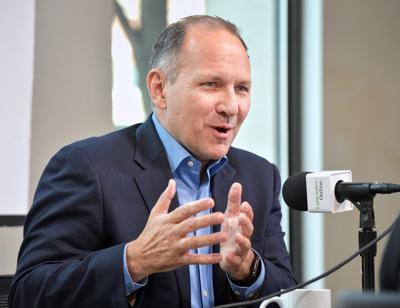THE ISSUE
The Problem Solvers Caucus in Congress unveiled a 10-point proposal at a July 25 press conference intended to promote bipartisanship and force action on widely popular bills that often get blocked or marginalized. GOP U.S. Rep. Lloyd Smucker is one of 48 members of the caucus — 24 Republicans and 24 Democrats. He represents the 16th Congressional District, and is seeking re-election in November to represent the new 11th District.
Control of the next Congress is up for grabs. And we — like members of the Problem Solvers Caucus — urge candidates in the running for leadership positions, in both parties, to pledge to support the caucus’ plan to break the gridlock in the U.S. Capitol, that beautiful and historic building where nothing ever seems to get accomplished.
“We all get frustrated. We come here with those high hopes as freshmen and realize that there’s a lot of sand in the gears here,” Smucker said at the Problem Solvers press conference last month, as reported by LNP’s Sam Janesch.
“There is … too much power concentrated in the hands of too few. And the rules process — the structure — discourages bipartisanship,” Republican Rep. Mike Coffman, of Colorado, said.
His colleague across the aisle, Rep. Josh Gottheimer, of New Jersey, a co-chairman of the group, agreed: “We’ve seen time and again how our commonsense solutions get jammed up in a system built to empower the voices of a few extremists.”
According to Janesch, here is some of what the “Break the Gridlock” proposal would do:
— Fast-track bills co-sponsored by two-thirds of the entire House, requiring them to get considered in committee and potentially sent to the floor.
— Establish the party ratio of every committee (with the exception of the Ethics Committee, which is evenly divided) to reflect the party ratio of the entire House.
— Give at least three days’ notice before a committee marks up a bill, giving members of the minority party more time to prepare.
— Require one-third of the entire House to call for a vote on unseating the speaker, rather than just one legislator, as under current rules.
Smucker joined the Problem Solvers last year during debate over proposed repeal of the Affordable Care Act. The group has since offered compromise plans on topics such as health care.
However, as Republican U.S. Rep. Brian Fitzpatrick, of Bucks County, said at the press conference, “not a single one saw the light of day.”
In an August 2017 editorial, we praised Smucker and the Problem Solvers Caucus for putting forward a compromise health care bill, which we called “a start.”
So we share the frustration of Fitzgerald and his caucus colleagues that this legislation and other bipartisan bills were never given a chance.
Our politics are so heated these days. Too many of our elected officials in Washington care more about the political affiliation of a person promoting an idea than the merits of that idea. That’s why we’ve been supportive of the Problem Solvers Caucus.
And the fact that there are so many huge problems to solve that aren’t being addressed is why we enthusiastically support the “Break the Gridlock” proposal.
And we’re encouraged that at least one potential speaker of the House has responded positively.
Rep. Steny Hoyer, of Maryland, the current Democratic whip, said in a statement:
“The rules changes unveiled today by the bipartisan Problem Solvers Caucus represent an important effort to ensure that the House can work its will and serve the American people effectively. ... It is critical that members are empowered to bring legislation forward and have their bills considered under regular order, and we ought to return to a process where major legislation is shaped by members in committee and not behind closed doors by a select few. ...
“The American people deserve a Congress that works for them, in which they can place their trust once more.”
When asked if his vote for a speaker will be predicated on the candidate’s support for the plan, Smucker told Janesch, “We want these kind of changes to be committed to by whoever that new speaker will be and this certainly is a condition of our support for that speaker.”
As if illustrating the point about compromise, not every member of the Problem Solvers agrees with everything in the plan. For example, as Janesch noted, caucus member Rep. Glenn Thompson, a Republican who represents parts of central Pennsylvania, doesn’t think all 435 representatives should get at least one of their bipartisan bills marked up every session.
“He views this like receiving a trophy for participation and believes that legislation should be taken up based upon its policy merits and benefit for the public good, not the whims of a particular member,” his spokeswoman, Renee Gamela, said.
According to a statement from Smucker’s office, the caucus plans to work with other House caucuses “to help build consensus around House rules changes ahead of the next Congress.”
The statement also describes the Problem Solvers as members of both parties “who believe in attacking problems, not people.”
The entire House membership should take a cue from the caucus and do just that — attack problems instead of people.
The “Break the Gridlock” rule changes are a positive step that could go a long way toward making the U.S. House of Representatives function effectively again. And that’s something we should all — Republican, Democrat, independent, you name it — get behind.




